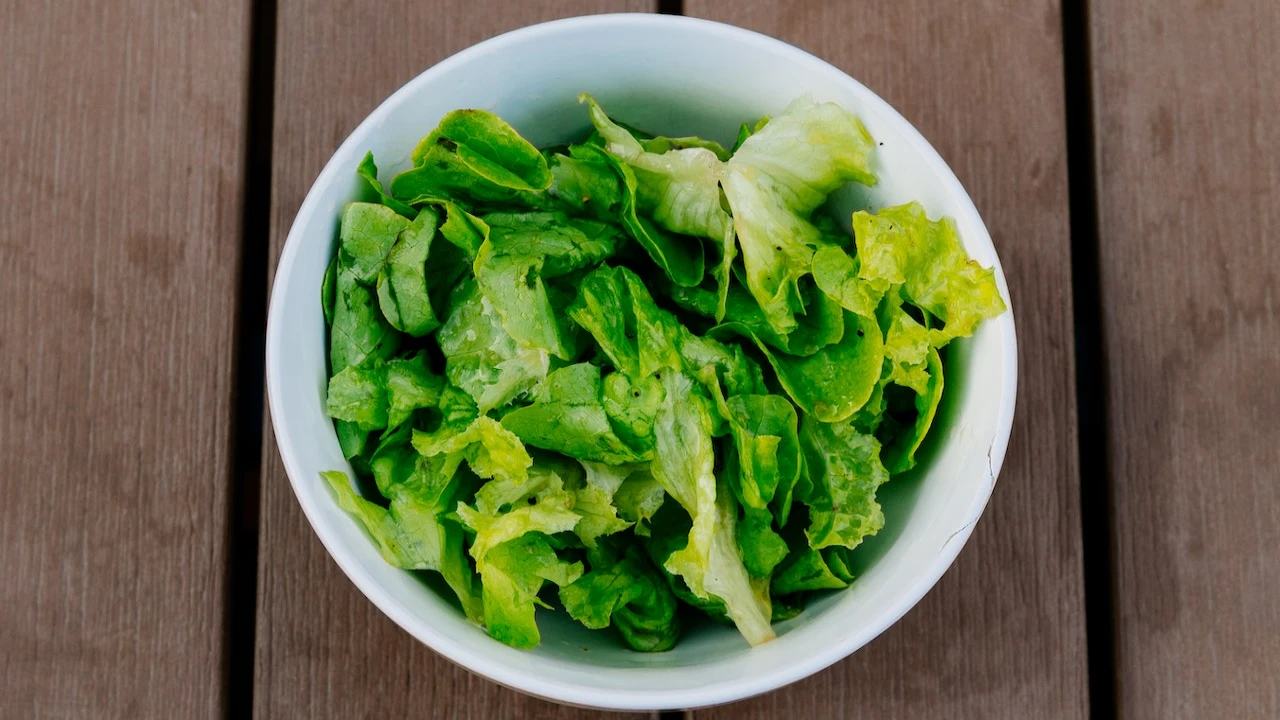Top 20 Impressive Benefits of Lettuce for Health, Skin, And Hair
Widely used in salads globally, the benefits of lettuce transcend beauty, skincare, and overall health. Here’s everything you need to know about this vegetable.

Lettuce is considered to be one of the most commonly found and consumed leafy vegetables. It is widely used in salads, soups, sandwiches, etc around the world. While it may be a great way to add some crunch to your meals, lettuce leaves may also deliver essential nutrients to your body. Lettuce is packed with vitamins, minerals, and chemical compounds like carotenoids, flavonoids, vitamin B groups, phenolic acid, tocopherols, ascorbic acid, etc which may be beneficial for your body and overall health (1). So, are you wondering what lettuce is good for? Keep reading to learn all about the benefits of lettuce for your skin, hair, and health.
What Are the Health Benefits of Lettuce
According to studies, the benefits of eating lettuce depend on its composition and the presence of antioxidants which may together function as nutrients. Further, research states that these health benefits of lettuce rely on the biochemical effect that may occur when the nutrients enter your bloodstream (2). Here are the 20 best benefits of lettuce for your skin, hair, and health that you ought to know.
1. May Boost Your Heart Health

As per our contributor, Corrigan Duffy who is a chef and food blogger, vitamin C helps keep our heart healthy by supporting blood vessel health, reducing inflammation, and acting as an antioxidant to protect against oxidative stress. Lettuce leaves are packed with vitamin C which may help in reducing arterial stiffness and treating cardiovascular diseases (3). Various studies suggest that consuming lettuce may strengthen the arteries in your heart and may be beneficial in preventing heart attacks (1), (3).
Further, according to research, lettuce is abundant in folate which is a form of vitamin B that helps in converting homocysteine to methionine. If this homocysteine is not converted, it may damage your blood vessels and cause an accumulation of plaque. Eventually, this might result in damage to your heart. Hence, one of the most important benefits of lettuce is that it contains folic acid which can assist in boosting your heart’s health (4).
2. May Help Fight Inflammation
According to an Iranian study, lettuce belongs to the Compositae family. The seeds of this plant have been used for providing relief from inflammation and osteodynia (which refers to pain in your bones). Also, the presence of certain proteins in lettuce like lipoxygenase might be beneficial in controlling and fighting inflammation. Thus, eating lettuce benefits your body in multiple ways (5). Additionally, studies state that the vitamins A, E, C, and K in lettuce might help in lowering inflammation in your body (6), (7).
3. May Improve Brain Health
When too much harm has been caused to your brain, it might lead to the death of neuronal cells. This may lead to fatal brain diseases like Alzheimer's. According to research, the extracts found in lettuce play a pivotal role in regulating glucose deprivation in your body and preventing neuronal death (8). Hence, adding lettuce to your meals can help keep brain disorders at bay.
4. May Help Promote Weight Loss
Talking about the qualities of lettuce contributing towards weight loss, our contributor Corrigan Duffy says, “Lettuce aids in weight loss due to its low-calorie content, high fiber, and water content, promoting a feeling of fullness and reducing overall calorie intake.
Eating lettuce everyday might be an ideal option to aid in weight loss due to its calorie content. Studies suggest that lettuce has a high amount of water content and is low in calories (9). Moreover, it is a powerhouse of essential nutrients which makes it the perfect food item to lose weight and nourish your body. One of the major benefits of eating romaine lettuce is that it might assist you in healthy weight management.
5. May Help Boost Your Immunity
Since lettuce is packed with rich nutrients, vitamins, and minerals; one amazing benefit of lettuce is that it may help boost immunity. According to research, it is packed with carotenoids, flavonoids, vitamin B groups, phenolic acid, tocopherols, ascorbic acid, etc which may be beneficial for your body and overall health (1), (2).
6. May Help Treat Insomnia

Studies claim that lettuce contains a substance called lactucarium, which might assist in sedating your nervous system and promote quality sleep. Hence, it is recommended to include lettuce leaves in your dinner as it may provide sound sleep to you (10).
7. May Enhance the Health of Your Bones
Lettuce is rich in vitamins like A, K, and C; all of which are imperative in the production of collagen (the first step in the process of bone formation). Vitamin K helps in modulating bone metabolism, works on bone density, and builds cartilage and the connective tissues in your body (11). Vitamin A assists in the development of new bone cells (12). Vitamin C combats bone depletion, which is one of the biggest factors involved in aging (13).
8. May Help Lower the Risk of Cancer
According to Japanese research, the antioxidant properties along with other nutritional elements in lettuce may help in lowering the risk of cancer (14).
9. Lettuce Helps You Stay Hydrated
Are you wondering apart from these physiological and health benefits, what does lettuce do for your body? Here’s your answer — consuming this vegetable regularly may help in keeping your body hydrated naturally and easily. According to research, lettuce has a high water content and is also low in calories. Hence, because of this, eating lettuce in your daily meals might be a good substitute for water to keep you nourished and hydrated (9).
10. May Help Treat Anemia
Due to the presence of folate, consuming lettuce may be beneficial as it would eliminate the deficiency of folate (lack of which might cause some forms of anemia) (15). According to studies, folate might also help in combating megaloblastic anemia wherein the blood cells appear to be very large and underdeveloped (16). It is also known in one research that eating lettuce might be effective in the treatment of vitamin B12 deficiency anemia (17).
11. May Help Cut the Risk of Diabetes
According to research, lettuce contains a chemical compound called Lactucaxanthin which is an anti-diabetic carotenoid. When this element enters your bloodstream, it might be beneficial for your body as it lowers blood glucose levels and may be a potential treatment to treat diabetes (18).
12. May Improve Muscle Strength

The benefits of lettuce might also have a pivotal role in improving your muscle strength. This vegetable contains a good amount of nitrates which are known to promote exercise capacity. Hence, eating lettuce may help in promoting improved muscle strength (19).
13. May Help Boost Your Vision
One of the significant benefits of eating romaine lettuce is that it can help you improve your vision. Studies state that Lettuce contains elements like zeaxanthin, which is an antioxidant that may improve your vision. This chemical compound has also been proven to fight age-related macular degeneration (20). Sources of dark green vegetables like lettuce contain both lutein and zeaxanthin, which may help promote good vision. Further, other studies have proved that these two chemical compounds play a pivotal role in improving your vision, boosting eye health, and fighting cataracts, and other forms of eye diseases (21), (22).
14. May Help Increase Your Metabolism
According to research, consuming lettuce regularly might have a beneficial effect on your lipid metabolism and the oxidation of your body tissues. This may eventually become a positive factor in boosting your metabolism and protecting you against cardiovascular diseases (23).
15. May Lower the Risk of Birth Defects
The health benefits of lettuce may also help pregnant women to be at ease. According to studies, lettuce is rich in folate which might help reduce the risk of birth defects (4), (24). Further, the deficiency of vitamin K during pregnancy may cause bleeding (25). While taking vitamin K shots are recommended to prevent this, consuming foods rich in vitamin K might also help. Hence, since lettuce has vitamin K, it may help fight this unanticipated bleeding (26).
16. May Improve Your Skin Health

According to research, lettuce juice benefits in improving the appearance and health of your skin. Lettuce contains polyphenols that may have anti-inflammatory, antibacterial, antifungal, and antiviral properties which may be beneficial for your skin. These properties might soothe irritation, reduce redness, boost elasticity, smoothen, and hydrate your skin (27).
17. May Stimulate Hair Growth
Experience and anecdotal evidence state that drinking lettuce juice regularly might be beneficial for your hair. According to Shikha Agarwal, a Certified Nutritionist, “Lettuce contains vitamins A and K, antioxidants like vitamins C and E, and trace amounts of biotin and folate. These nutrients indirectly support hair health by aiding cell growth, maintaining circulation, and protecting against oxidative stress. However, no single food can directly promote significant hair growth, as genetics, hormones, and overall nutrition play essential roles in hair health.” Due to the presence of essential vitamins, minerals, and other chemical compounds in this leafy vegetable; the consumption of lettuce juice may promote hair growth and keep your tresses healthy in the long run (9).
18. May Help Revitalize Your Skin
Lettuce leaves are rich in nutrients like vitamin A which may be beneficial for your skin health. According to research, when vitamin A enters your bloodstream, it is absorbed as retinol which may eventually increase the cell turnover in your body, leaving you with revitalized and glowing skin (28). Moreover, the antioxidant properties of lettuce help fight free radicals and keep the skin healthy (27).
19. May Help Regulate Blood Pressure Levels
The green leaves of lettuce are enriched with potassium or vitamin K which might have a positive impact on your blood pressure and flow. According to research, dietary intake of potassium may help lower blood pressure and improve blood circulation. Nutritionist Shikha Agarwal also says, “Potassium is an essential mineral that plays a crucial role in maintaining bodily functions such as fluid balance, muscle contractions, and nerve function. High sodium intake can lead to water retention and increased blood volume, which raises blood pressure. Potassium counteracts this effect by helping the body excrete excess sodium and by relaxing blood vessel walls, reducing resistance to blood flow and thus lowering blood pressure. Lettuce contains potassium, which contributes to its potential role in supporting healthy blood pressure levels. It's important to note that while lettuce contains potassium, it is not among the highest potassium-containing foods.”
20. Lettuce Provides Your Body with Vital Micro-Minerals And Other Nutrients
Lettuce is rich in vitamins, minerals, and chemical compounds which may nourish your body. Studies suggest that it is packed with vitamins, minerals, and chemical compounds like carotenoids, flavonoids, vitamin B groups, phenolic acid, tocopherols, ascorbic acid, etc which may be beneficial for your body and overall health (1). According to anecdotal evidence, the presence of elements like silicon, phosphorus, and sulfur in lettuce leaves might be beneficial in maintaining good hair, skin, and nails.
Conclusion
Lettuce has been widely used in cuisines all around the world. From soups, and salads, to other meals; this vegetable has been relied on to add crunch. There are various types of lettuce available like romaine lettuce, butterhead, celtuce, and more. Green forms of lettuce are the ones packed with the most nutrients. While it is used to elevate your meals, the health benefits of lettuce are even better.
Lettuce has elements like carotenoids, flavonoids, vitamin B groups, phenolic acid, and tocopherols which may benefit your body and health (1). It is packed with other nutrients like vitamin A, potassium, sulfur, etc (9). Some of the best benefits of lettuce for your skin, hair, and health may include advantages like reduced risk of diabetes, improved metabolism, good vision, improved skin health, and so on. Thus, eating lettuce benefits your body and health in distinct ways. You may have lettuce raw or drink its juice. However, it is important to ensure that you have a regular intake for the best results and good health.
Sources:
1. Bioactive compounds in lettuce: Highlighting the benefits to human health and impacts of preharvest and postharvest practices
https://pubmed.ncbi.nlm.nih.gov/34935264/
2. Phytochemicals, Nutrition, Metabolism, Bioavailability, and Health Benefits in Lettuce-A Comprehensive Review
https://pubmed.ncbi.nlm.nih.gov/35740055/
3.Oral vitamin C reduces arterial stiffness and platelet aggregation in humans
https://pubmed.ncbi.nlm.nih.gov/10547085/
4.Folic Acid Supplementation and the Risk of Cardiovascular Diseases: A Meta?Analysis of Randomized Controlled Trials
https://www.ncbi.nlm.nih.gov/pmc/articles/PMC5015297/
5.Analgesic and anti-inflammatory activity of Lactuca sativa seed extract in rats
https://pubmed.ncbi.nlm.nih.gov/15138019/
6.Evaluation of analgesic, anti-inflammatory, anti-depressant and anti-coagulant properties of Lactuca sativa (CV. Grand Rapids) plant tissues and cell suspension in rats
https://www.ncbi.nlm.nih.gov/pmc/articles/PMC4482268/
7.Nutritional quality, mineral and antioxidant content in lettuce affected by interaction of light intensity and nutrient solution concentration
https://www.ncbi.nlm.nih.gov/pmc/articles/PMC7029024/
8.Mechanism of protective effect of lettuce against glucose/serum deprivation-induced neurotoxicity
https://pubmed.ncbi.nlm.nih.gov/24621063/
9.Optimal Diet Strategies for Weight Loss and Weight Loss Maintenance
https://www.ncbi.nlm.nih.gov/pmc/articles/PMC8017325/
10.Sleep-inducing effect of lettuce (Lactuca sativa) varieties on pentobarbital-induced sleep
https://www.ncbi.nlm.nih.gov/pmc/articles/PMC6049580/
11.Vitamin K and bone health
https://pubmed.ncbi.nlm.nih.gov/11684396/
12.Vitamin A and bone health: the balancing act
https://pubmed.ncbi.nlm.nih.gov/24183637/
13.Essential Nutrients for Bone Health and a Review of their Availability in the Average North American Diet
https://www.ncbi.nlm.nih.gov/pmc/articles/PMC3330619/
14.Beneficial Phytochemicals with Anti-Tumor Potential Revealed through Metabolic Profiling of New Red Pigmented Lettuces (Lactuca sativa L.)
https://www.ncbi.nlm.nih.gov/pmc/articles/PMC5979491/
15.Folic Acid Deficiency
https://www.ncbi.nlm.nih.gov/books/NBK535377/
16.Megaloblastic Anemia
https://www.ncbi.nlm.nih.gov/books/NBK537254/
17.Vitamin B12 among Vegetarians: Status, Assessment and Supplementation
https://www.ncbi.nlm.nih.gov/pmc/articles/PMC5188422/
18.Lactucaxanthin - a potential anti-diabetic carotenoid from lettuce (Lactuca sativa) inhibits α-amylase and α-glucosidase activity in vitro and in diabetic rats
https://pubmed.ncbi.nlm.nih.gov/28170007/
19.Does Nutrition Play a Role in the Prevention and Management of Sarcopenia?
https://www.ncbi.nlm.nih.gov/pmc/articles/PMC5796643/
20.Nutrients for Prevention of Macular Degeneration and Eye-Related Diseases
https://www.ncbi.nlm.nih.gov/pmc/articles/PMC6523787/
21.Lutein and Zeaxanthin—Food Sources, Bioavailability and Dietary Variety in Age-Related Macular Degeneration Protection
https://www.ncbi.nlm.nih.gov/pmc/articles/PMC5331551/
22.Dietary Sources of Lutein and Zeaxanthin Carotenoids and Their Role in Eye Health
https://www.ncbi.nlm.nih.gov/pmc/articles/PMC3705341/
23.Health effect of vegetable-based diet: lettuce consumption improves cholesterol metabolism and antioxidant status in the rat
https://pubmed.ncbi.nlm.nih.gov/15297097/
24.Folic acid and the prevention of birth defects
https://pubmed.ncbi.nlm.nih.gov/8839920/
25.Vitamin K Deficiency
https://pubmed.ncbi.nlm.nih.gov/30725668/
26.Vitamin K
https://ods.od.nih.gov/factsheets/vitaminK-HealthProfessional/
27.Bioactive Compounds for Skin Health: A Review
https://www.ncbi.nlm.nih.gov/pmc/articles/PMC7827176/
28.The Role of Vitamin A in Wound Healing
https://pubmed.ncbi.nlm.nih.gov/31389093/
29.Role of potassium in regulating blood flow and blood pressure
https://pubmed.ncbi.nlm.nih.gov/16467502/
30. Antioxidants in dermatology*
https://www.ncbi.nlm.nih.gov/pmc/articles/PMC5514576/
31. Phytochemicals, Nutrition, Metabolism, Bioavailability, and Health Benefits in Lettuce—A Comprehensive Review
https://www.ncbi.nlm.nih.gov/pmc/articles/PMC9219965/
Contributor:
Corrigan Duffy, Chef and Food Blogger, Corrie Cooks





 JOIN OUR WHATSAPP CHANNEL
JOIN OUR WHATSAPP CHANNEL














































